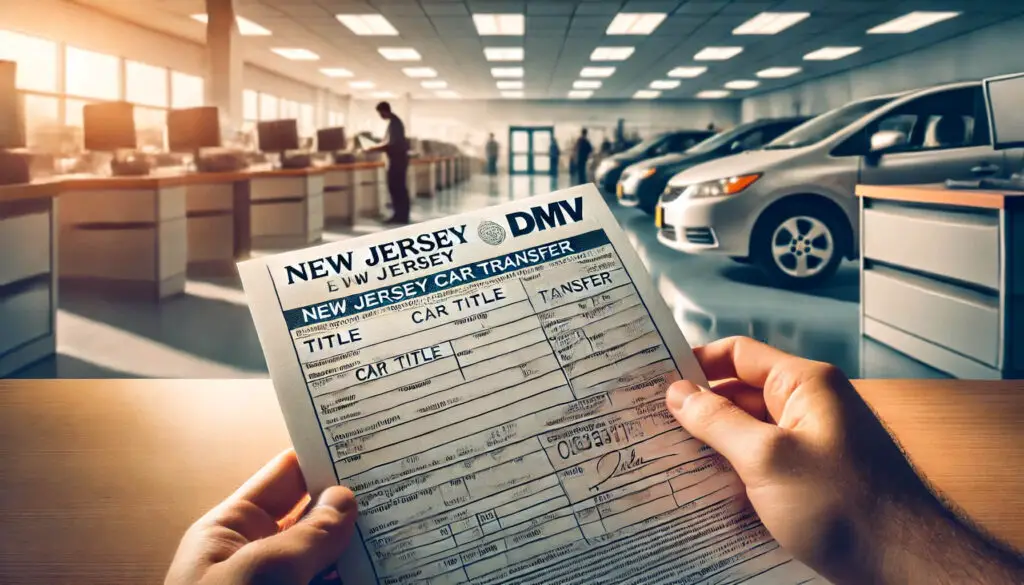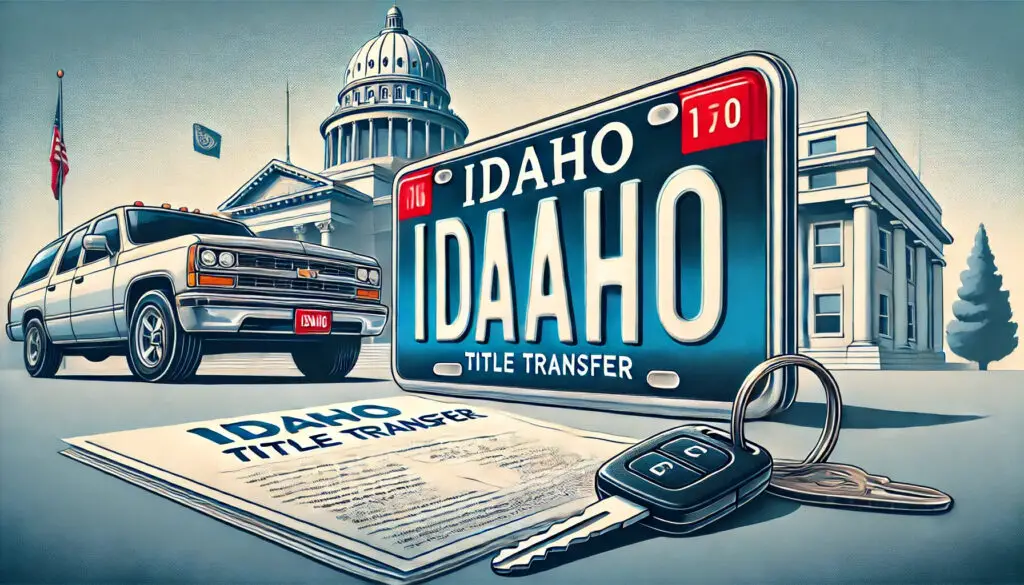Transferring a vehicle title in New Jersey may seem like a complicated task, but with the right guidance and preparation, it can be a smooth and straightforward process. Whether you’re buying or selling a car, understanding the necessary steps and required documents is essential to avoid delays or penalties. This comprehensive guide will take you through every step of the New Jersey title transfer process, from gathering the necessary paperwork to completing the transaction at your local Motor Vehicle Commission (MVC) office.
Introduction to Vehicle Title Transfer in New Jersey
What is Title Transfer?
A vehicle title transfer refers to the process of officially transferring ownership of a vehicle from one party to another. In New Jersey, the Motor Vehicle Commission (MVC) handles all title transfers to ensure the correct legal documentation and registration are in place.
Importance of Vehicle Title Transfer in New Jersey
Title transfer is a legal requirement when buying or selling a vehicle in New Jersey. It ensures that the buyer becomes the official owner of the vehicle, and it also helps the state maintain accurate vehicle ownership records. Failing to complete the title transfer on time can lead to penalties and complications, so it’s crucial to follow the process carefully.
Required Documents for Title Transfer
Before you head to the MVC, you will need to gather a few important documents. Here’s a list of everything you’ll need for a successful title transfer:
Vehicle Title
The most important document in the transfer process is the vehicle title. The title must be signed by both the buyer and the seller. It should include essential details, such as the vehicle’s make, model, and year. If the title has been lost, you’ll need to apply for a duplicate title before proceeding with the transfer.
Proof of Insurance
New Jersey law requires that the buyer provides proof of valid auto insurance before completing the title transfer. Your insurance policy must be current and cover the specific vehicle being transferred.
Identification
Both the buyer and the seller must present valid identification, such as a driver’s license or another government-issued ID. This is necessary to verify the identities of both parties involved in the transaction.
Vehicle Registration Application (Form BA-49)
Form BA-49 is used to apply for vehicle registration and is required for completing the title transfer. This form can be obtained online from the MVC website or in person at a local MVC office.
Step 1: Completing the Title Transfer Document
The first step in the title transfer process is to ensure that the title itself is correctly filled out. This involves several key actions from both the buyer and the seller.
Signing the Title
Both parties must sign the title on the back. The seller signs to release ownership, and the buyer signs to accept the vehicle. If the title has multiple owners, all must sign.
Buyer and Seller Responsibilities
- Seller’s Responsibilities: The seller must provide their driver’s license number and the vehicle’s odometer reading. The seller is also responsible for indicating the sale price on the title for tax purposes.
- Buyer’s Responsibilities: The buyer must fill out their driver’s license number and ensure the vehicle’s odometer reading is correctly recorded.
Odometer Reading and Sale Price for Tax Purposes
The buyer is required to record the vehicle’s odometer reading at the time of transfer, which is crucial for verifying the car’s mileage. Additionally, the sale price must be listed for tax calculations.
Step 2: Visit Your Local New Jersey MVC Office
Once the title is complete, the next step is to visit your local MVC office to submit the documents and complete the title transfer. Here’s what to expect during your visit:
MVC Locations and Offices
New Jersey has several MVC locations across the state. You can find your nearest office by visiting the official MVC website. Some locations may require an appointment, especially during peak times, so it’s a good idea to check ahead.
Appointment Requirement
In many cases, appointments are necessary to complete a title transfer. You can schedule an appointment online through the MVC’s website or call the office to check availability. During busy times, such as the end of the month or the holiday season, it’s particularly important to plan ahead.
Preparing for Your Visit
Before heading to the MVC, double-check that you have all the required documents, including the signed title, proof of insurance, valid ID, and the completed BA-49 form. This will help ensure that the process goes smoothly.
Step 3: Paying Fees for Title Transfer
The title transfer process is not free. There are fees associated with the transaction, and understanding them ahead of time will help you plan your budget accordingly.
Standard Title Transfer Fee
The standard title transfer fee in New Jersey is $60. This fee must be paid at the time of the title transfer. Payments can usually be made by check, cash, or credit/debit card, depending on the MVC location.
Additional Fees for Vehicles with Liens or Special Circumstances
If the vehicle has a lien on it, additional paperwork and fees may apply. The lienholder must be notified, and they may need to release the lien before the transfer can be completed.
Step 4: Receiving the New Title and Registration
After completing the title transfer process, you will receive your new title and vehicle registration.
Timeline for Receiving Documents
In most cases, the MVC will issue your new title and registration on the same day. However, some transactions may take a few weeks to process, especially if there are issues with the paperwork or additional checks are required.
What to Do with the New Title and Registration
Once you receive the new title, make sure to keep it in a safe place, as it serves as proof of ownership. The registration should be kept in the vehicle at all times.
Important Considerations When Transferring a Title
There are several factors to keep in mind when transferring a vehicle title in New Jersey to avoid unnecessary complications.
Time Limit to Avoid Penalties
The title transfer must be completed within 10 days of the sale date. Failing to do so will result in a $25 penalty. Make sure to schedule your MVC visit promptly after the sale to avoid this fee.
Lienholders and Their Role
If the vehicle has any outstanding loans or liens, the lienholder must be notified, and they may need to provide additional documentation. The lienholder’s signature is required to release the lien before the title can be transferred.
Out-of-State Vehicle Title Transfer
If you’re bringing a vehicle into New Jersey from another state, there are additional steps, such as obtaining a vehicle inspection. This process ensures that the vehicle meets New Jersey’s environmental and safety standards.
Common Mistakes to Avoid During Title Transfer
There are a few common errors that people make when transferring a title. Avoid these pitfalls to ensure the process goes as smoothly as possible.
Checking for Errors on Documents
Before submitting your documents, make sure there are no errors in the information. A small mistake, such as a misspelled name or incorrect vehicle identification number (VIN), can delay the process.
Omissions to Watch For
Ensure that all necessary fields are filled out, including the odometer reading, sale price, and the signatures of both the buyer and seller. Missing information can cause delays or rejection of your application.
Importance of Accurate Information
Accurate and up-to-date information is crucial for a successful title transfer. Double-check all personal information and vehicle details to ensure that everything is correct.
Special Cases in Title Transfer
Some title transfer situations are more complex than others, such as transferring a title for an inherited vehicle or a car with a lien.
Title Transfer for Inherited Vehicles
If you inherit a vehicle, the process of transferring the title will differ slightly. You’ll need to provide proof of the inheritance, such as a will or probate documentation, along with the usual documents.
Title Transfer for Vehicles with Liens
Transferring a title for a vehicle with a lien requires additional paperwork. The lienholder must be involved in the transfer process to release their claim on the vehicle.
Out-of-State Vehicles
Transferring the title for a vehicle from another state involves extra steps, including obtaining a New Jersey vehicle inspection.
What to Do if There Are Liens on the Vehicle
If the vehicle has a lien, you’ll need to address it before transferring the title.
Understanding Liens
A lien is a legal claim on the vehicle, usually due to an outstanding loan. Until the lien is satisfied, the title cannot be fully transferred.
Notifying the Lienholder
You must notify the lienholder about the title transfer and follow their instructions for releasing the lien.
Steps to Take if There’s a Lien on the Vehicle
If there’s a lien on the vehicle, ensure that all payments are up to date, and obtain the lien release documents from the lienholder before completing the transfer.
Additional Tips for a Smooth Title Transfer
Here are a few final tips to make the title transfer process as smooth as possible.
Keep Copies of All Documents
Before submitting your paperwork, make copies of all documents for your records. This will help if there are any issues down the line.
Double-Check Before Submission
Carefully review all documents before submitting them to the MVC. Mistakes or missing information can cause delays.
Ask MVC for Clarifications
If you’re unsure about any part of the process, don’t hesitate to ask an MVC representative for clarification.
Frequently Asked Questions (FAQs)
- What is the deadline for completing a title transfer in New Jersey?
- The title transfer must be completed within 10 days of the sale date to avoid a $25 penalty.
- What documents are needed to transfer a vehicle title?
- You’ll need the signed vehicle title, proof of insurance, valid ID, and the BA-49 form.
- How do I transfer a vehicle title if it has a lien?
- You must notify the lienholder and obtain a lien release before completing the transfer.
- What happens if I miss the title transfer deadline?
- You will be fined $25 if the transfer is not completed within 10 days of the sale.
- Do I need to make an appointment at the MVC?
- It’s recommended to make an appointment, especially during busy periods.
- Can I transfer a vehicle title if it’s from another state?
- Yes, but additional steps, such as a vehicle inspection, may be required.
Conclusion
Transferring a vehicle title in New Jersey is a process that requires attention to detail and proper documentation. By following the steps outlined in this guide, you can ensure that your title transfer is completed smoothly and without unnecessary complications. Whether you’re a buyer or a seller, understanding the requirements and preparing in advance is key to a successful transaction.











